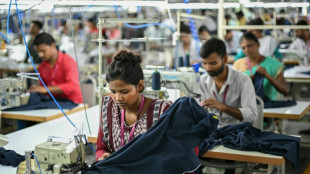-
 Barca edge Real Madrid in thrilling Spanish Super Cup final
Barca edge Real Madrid in thrilling Spanish Super Cup final
-
Malinin spearheads US Olympic figure skating challenge

-
 Malinin spearheads US figure Olympic figure skating challenge
Malinin spearheads US figure Olympic figure skating challenge
-
Iran rights group warns of 'mass killing', govt calls counter-protests

-
 'Fragile' Man Utd hit new low with FA Cup exit
'Fragile' Man Utd hit new low with FA Cup exit
-
Iran rights group warns of 'mass killing' of protesters

-
 Demonstrators in London, Paris, Istanbul back Iran protests
Demonstrators in London, Paris, Istanbul back Iran protests
-
Olise sparkles as Bayern fire eight past Wolfsburg

-
 Man Utd knocked out of FA Cup by Brighton, Martinelli hits hat-trick for Arsenal
Man Utd knocked out of FA Cup by Brighton, Martinelli hits hat-trick for Arsenal
-
Troubled Man Utd crash out of FA Cup against Brighton

-
 Danish PM says Greenland showdown at 'decisive moment' after new Trump threats
Danish PM says Greenland showdown at 'decisive moment' after new Trump threats
-
AC Milan snatch late draw at Fiorentina as title rivals Inter face Napoli

-
 Venezuelans demand political prisoners' release, Maduro 'doing well'
Venezuelans demand political prisoners' release, Maduro 'doing well'
-
'Avatar: Fire and Ashe' leads in N.America for fourth week

-
 Bordeaux-Begles rout Northampton in Champions Cup final rematch
Bordeaux-Begles rout Northampton in Champions Cup final rematch
-
NHL players will compete at Olympics, says international ice hockey chief

-
 Kohli surpasses Sangakkara as second-highest scorer in international cricket
Kohli surpasses Sangakkara as second-highest scorer in international cricket
-
Young mother seeks five relatives in Venezuela jail

-
 Arsenal villain Martinelli turns FA Cup hat-trick hero
Arsenal villain Martinelli turns FA Cup hat-trick hero
-
Syrians in Kurdish area of Aleppo pick up pieces after clashes

-
 Kohli hits 93 as India edge New Zealand in ODI opener
Kohli hits 93 as India edge New Zealand in ODI opener
-
Trump tells Cuba to 'make a deal, before it is too late'

-
 Toulon win Munster thriller as Quins progress in Champions Cup
Toulon win Munster thriller as Quins progress in Champions Cup
-
NHL players will complete at Olympics, says international ice hockey chief

-
 Leeds rally to avoid FA Cup shock at Derby
Leeds rally to avoid FA Cup shock at Derby
-
Rassat sweeps to slalom victory to take World cup lead

-
 Liverpool's Bradley out for the season with 'significant' knee injury
Liverpool's Bradley out for the season with 'significant' knee injury
-
Syria govt forces take control of Aleppo's Kurdish neighbourhoods

-
 Comeback kid Hurkacz inspires Poland to first United Cup title
Comeback kid Hurkacz inspires Poland to first United Cup title
-
Kyiv shivers without heat, but battles on

-
 Salah and fellow stars aim to deny Morocco as AFCON reaches semi-final stage
Salah and fellow stars aim to deny Morocco as AFCON reaches semi-final stage
-
Mitchell lifts New Zealand to 300-8 in ODI opener against India

-
 Malaysia suspends access to Musk's Grok AI: regulator
Malaysia suspends access to Musk's Grok AI: regulator
-
Venezuelans await release of more political prisoners, Maduro 'doing well'

-
 Kunlavut seals Malaysia Open title after injured Shi retires
Kunlavut seals Malaysia Open title after injured Shi retires
-
Medvedev warms up in style for Australian Open with Brisbane win

-
 Bublik powers into top 10 ahead of Australian Open after Hong Kong win
Bublik powers into top 10 ahead of Australian Open after Hong Kong win
-
Sabalenka fires Australian Open warning with Brisbane domination

-
 In Gaza hospital, patients cling to MSF as Israel orders it out
In Gaza hospital, patients cling to MSF as Israel orders it out
-
New protests hit Iran as alarm grows over crackdown 'massacre'

-
 Svitolina powers to Auckland title in Australian Open warm-up
Svitolina powers to Auckland title in Australian Open warm-up
-
Keys draws on happy Adelaide memories before Australian Open defence

-
 Scores of homes razed, one dead in Australian bushfires
Scores of homes razed, one dead in Australian bushfires
-
Ugandan opposition turns national flag into protest symbol

-
 Bears banish Packers, Rams survive Panthers playoff scare
Bears banish Packers, Rams survive Panthers playoff scare
-
'Quad God' Malinin warms up for Olympics with US skating crown

-
 India eyes new markets with US trade deal limbo
India eyes new markets with US trade deal limbo
-
Syria's Kurdish fighters agree to leave Aleppo after deadly clashes

-
 New York's Chrysler Building, an art deco jewel, seeks new owner
New York's Chrysler Building, an art deco jewel, seeks new owner
-
AI toys look for bright side after troubled start

Trump vs. EU: A good deal?
At the end of July 2025, US President Donald Trump and EU Commission President Ursula von der Leyen presented a transatlantic trade agreement at the Turnberry golf resort in Scotland, signalling a surprise agreement after months of escalating threats of punitive tariffs. At its heart is a 15% cap on almost all EU goods exported to the United States, while Brussels will in return scrap all tariffs on US industrial goods – a paradigm shift from the previous ‘zero tariff symmetry’.
In addition, the European Union has committed to purchasing US energy worth 750 billion dollars by 2028 and investing 600 billion dollars in American sites. These commitments are intended not only to improve the US trade balance, but also to reduce European dependence on third countries. Steel, aluminium and copper are exempt from the 15 per cent cap – here, surcharges of 50 per cent remain in place, which will hit traditional EU export industries particularly hard.
The legal framework for implementation is a presidential order signed on 31 July, which comes into force seven days later and adjusts the US Harmonised Tariff Schedule accordingly. Washington is selling the result as a ‘historic recalibration’ of trade relations; Brussels emphasises that it has averted an escalation of the announced 30% punitive tariffs and gained planning security.
But criticism in Europe is loud: German Chancellor Friedrich Merz warns of ‘considerable damage’ to competitiveness, while French Prime Minister François Bayrou speaks of a ‘dark day’ for industry. Economists expect many EU companies to have to choose between sacrificing margins and adjusting prices in the US – with potential inflationary and demand effects on both sides of the Atlantic.
In the medium term, the agreement is likely to cause massive shifts in supply chains: the US energy and defence sectors will benefit immediately, while European car and machine manufacturers will increasingly build up production capacities in North America – a trend that is already evident in current investment plans and reveals the complete incompetence of European politicians! However, before the package becomes legally binding, the 27 EU member states and the European Parliament must ‘still’ give their approval; several MEPs have announced a detailed review of the ‘asymmetrical agreement’.
Whether the agreement represents a stable new trade order or merely a respite depends on whether Brussels forces renegotiations – and whether Washington honours its commitments on market opening, investment and tariff reductions in the long term.

Hungary: China's CATL battery factory

Alice Weidel: AfD Chancellor Candidate 2025

Russia: Is Putin's time nearly up?

China, Trump, and the power of war?

Iran's Ayatollahs the next to Fall?

Who wins and who loses in Syria?

South Korea: Yoon Suk Yeol shocks Nation

Dictator Putin threatens to destroy Kiev

Will Trump's deportations be profitable?

Ishiba's Plan to Change Power in Asia

EU: Online platforms to pay tax?



